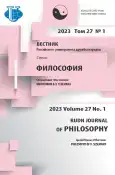Hellenic Theology of the Epoch of High Classics
- Authors: Naidysh V.M.1
-
Affiliations:
- Рeoples’ Friendship University of Russia (RUDN University)
- Issue: Vol 27, No 1 (2023): PHILOSOPHY OF V. SESEMANN
- Pages: 79-93
- Section: HISTORY OF PHILOSOPHY
- URL: https://journal-vniispk.ru/2313-2302/article/view/325281
- DOI: https://doi.org/10.22363/2313-2302-2023-27-1-79-93
- EDN: https://elibrary.ru/PDLULR
- ID: 325281
Cite item
Full Text
Abstract
The conceptual basis of Hellenic theology was theoretical reflection on the essence of myth, the philosophy of mythology. Several stages can be distinguished in the history of Hellenic theology. The subject of this article is the Hellenic theology of the epoch of the high classics (Vt. half of the V century BC). The cultural roots of the High Classics go back to the ancient Enlightenment, which formed the rational attitude of the ancient consciousness to the world. The main event of the era of High Classics is the Peloponnesian War, which accelerated the crisis of the polis system, its way of life, and cultural ideals. The war led to the rupture of social ties, accelerated the individualization of the consciousness of the individual, forced to seek new social and spiritual supports. Serious shifts have taken place in the existential foundations of Hellenic religion, the understanding of man's dependence on the will of the Olympian gods and the measure of human influence on them has changed. If at the beginning of the epoch of the High Classics there was a semantic harmony of the relations between the human and the divine, then by the end of the epoch it was replaced by the confrontation and alienation of the sacred and profane. Ideas about the dependence of man on the world of the gods and the possible influence on the sacred have "blurred", have become extremely uncertain. This tendency manifested itself in various forms - in the strengthening of the influence of sophistry with its skepticism, the opposition of Chthonic and Olympic mythologies, the actualization of the motive of the birth of new gods (while the old ones do not die at all), stories about the deification of bright personalities, etc. Including in the theology of the Hellenic religion, concentrated expressed by the plots and images of the ancient drama (Sophocles, Euripides). The juxtaposition of the sacred and the profane made Hellenic religion meaningless, led it to self-denial. Under these conditions, Hellenic theology was faced with the need to transform the image of the sacred world. Firstly, by giving the otherworldly reality an abstract-conceptual transcendence. Secondly, through the ultimate generalization of mythological images of the gods, up to monotheism. These tasks were solved by the next epoch - the late classics.
Keywords
About the authors
Viacheslav M. Naidysh
Рeoples’ Friendship University of Russia (RUDN University)
Author for correspondence.
Email: v.naidysh@bk.ru
DSc in Philosophy, Professor of the Department of Ontology and Epistemology 6 Miklukho-Maklaya St, Moscow, 117198, Russian Federation
References
- Naidysh VM. Philosophy of mythology. From antiquity to the era of romanticism. Moscow: Gardariki; 2002. (In Russian).
- Naydysh VM. Mythology and Theology. Second Article. RUDN Journal of Philosophy. 2019;23(2):210—221. https://doi.org/10.22363/2313-2302-2019-23-2-210-221 (In Russian).
- Naidysh VM. Mythmaking in the Activities of Consciousness. Voprosy Filosofii. 2017;(5):26—34. (In Russian).
- Naidysh VM. Hellenic theology of early classical period. RUDN Journal of Philosophy. 2020;24(4):669—680. https://doi.org/10.22363/2313-2302-2020-24-4-669-680
- Andreev YV. The price of freedom and harmony: A few touches to the portrait of Greek civilization. Saint Petersburg: Aletheia; 1998. (In Russian).
- Platon. State. In: Collected works: in 4 volumes. 2nd ed. Egunov AN, transl. Moscow: Mysl; 1994. Vol. 3. P. 79—420. (In Russian).
- Mauss M. Essai sur le don. Forme et raison de l'échange dans les sociétés archaïques. In: L’Année Sociologique. 1ère Année; 1923—1924. P. 30—186.
- Burkert W. Homo Necans. Interpretationen altgriechischer Opferriten und Mythen. Berlin: De Gruyter; 1972.
- Detienne M. La cuisine du sacrifice en pays grec. En collaboration avec Jean-Pierre Vernant. Paris: Gallimard; 1997.
- Voevodskij LF. Cannibalism in Greek myths. Experience in the history of the development of morality. Saint Petersburg: Typ. Academy of Sciences; 1874. (In Russian).
- Surikov IE. Archaic and Classical Greece: Problems of History and Source Studies. Moscow: KDU; 2007. (In Russian).
- Zelinskij FF. Hellenic religion. Minsk: Econompress; 2003. (In Russian).
- Herodotus. History. In nine volumes. Stratanovsky GA, transl. Leningrad: Science; 1972. (In Russian).
- Gomperz T. Greek thinkers. Vol. 1. Saint Petersburg: Ed. D.E. Zhukovsky; 1911. (In Russian).
- Surikov IE. Ancient Greece: Politics in the Context of the Epoch: The Heyday of Democracy. Moscow: Nauka; 2008. (In Russian).
- Akimova L. The Art of Ancient Greece: Classics. Saint Petersburg: Azbuka-klassika Publishing House; 2007. (In Russian).
- Aeschylus. Tragedies. Ivanov V, transl. Moscow: Science; 1989. (In Russian).
- Sophocles. Tragedies. Shervinsky SV. Moscow: GIHL; 1954. (In Russian).
- Lebedev AV. Fragments of early Greek Philosophers. Part 1. From Epic Theocosmogonies to the emergence of Atomistics. Moscow: Science; 1989. (In Russian).
- Sophocles. Oedipus in Colon. Zelinsky FF, transl. Moscow: Science; 1990. (In Russian).
- Thucydides. History. Stratanovsky GA. Leningrad: Science; 1981. (In Russian).
- Euripides. Tragedies. In 2 volumes. Literary Monuments. Moscow: Science, Ladomir; 1999. (In Russian).
- Euripides. Ippolit. Annensky I, transl. In: Tragedies. In 2 volumes. Literary Monuments. Moscow: Science, Ladomir; 1999. (In Russian).
- Tragedies d’Euripide. En 2 volumes. Artaud M, transl. Paris: Charpentier, Libraire-editeur; 1842. Available from: http://remacle.org/bloodwolf/tragediens/euripide/ Euripide7 (accessed: 15.01.22).
- Euripides. Elektra. Annensky I, transl. In: Tragedies. In 2 volumes. Literary Monuments. Moscow: Science, Ladomir; 1999. (In Russian).
- Euripides. Gekuba. Annensky I, transl. In: Tragedies. In 2 volumes. Literary Monuments. Moscow: Science, Ladomir; 1999. (In Russian).
Supplementary files









